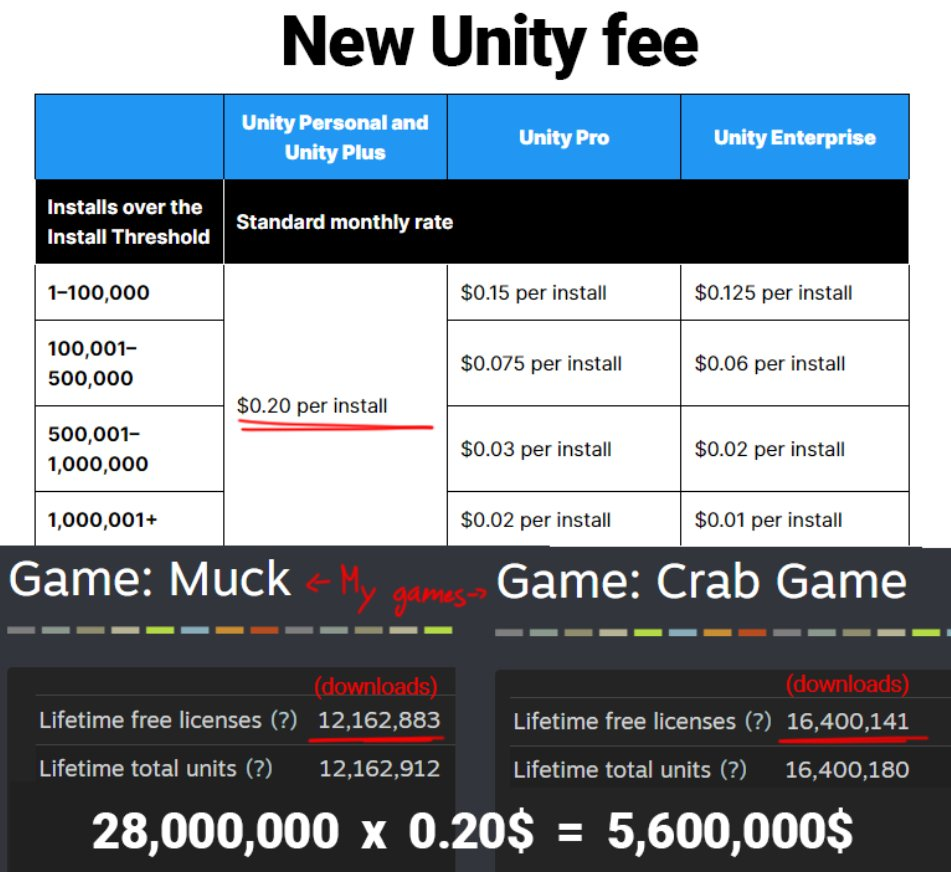So today Unity announced changes in how they are going to monetize their game engine, and it is, rightfully might I add, poorly recieved
Here is how much youtuber Dani would have to pay unity if they consider his games to gain over $200k in revenue

Now I don’t know how much tracking crackers and re-packers remove from the games getting cracked, but if unity were to count cracked games as a valid install (and they will count every install of a game they are aware of), thn piracy could seriously bankrupt indie devs. Like, not just losing them revenue, but actively losing them money. While piracy is already in an ethical grey area, I think that is just a bit too much. So, I want to raise awareness of this, and with it I have 2 questions to ask:
- Do the people that crack games make sure to remove the ability of unity tracking cracked installs?
- If the answer to the previous question is “no”, how do we make them aware of the fact that it is probably for the better if they do this?



I’m not involved in piracy/DRM/gamedev but I really doubt they’ll track cracked installs and if they do, actually get indie devs to pay.
Because what’s stopping one person from “cracking” a game, then “installing” it 1,000,000 times? Whatever metric they use to track installs has to prevent abuse like this, or you’re giving random devs (of games that aren’t even popular) stupidly high bills.
When devs see more installs than purchases, they’ll dispute and claim Unity’s numbers are artificially inflated. Which is a big challenge for Unity’s massive legal team, because in the above scenario they really are. Even if Unity successfully defends the extra installs in court, it would be terrible publicity to say “well, if someone manages to install your game 1,000 times without buying it 1,000 times you’re still responsible”. Whatever negative publicity Unity already has for merely charging for installs pales in comparison, and this would actually get most devs to stop using Unity, because nobody will risk going into debt or unexpectedly losing a huge chunk of revenue for a game engine.
So, the only reasonable metric Unity has to track installs is whatever metric is used to track purchases, because if someone purchases the game 1,000,000 times and installs it, no issue, good for the dev. I just don’t see any other way which prevents easy abuse; even if it’s tied to the DRM, if there’s a way to crack the DRM but not remove the install counter, some troll is going to do it and fake absurd amounts of extra installs.
I would be eagerly awaiting a follow-up response from unity from this, because as it stands right now, consensus among gamedev circles is that unity won’t prevent abuse at all, which is just awful for multiple groups of people.
Yeah most games are available offline, how would they track these metrics beyond steam/store sales?
And for the web games can they not be self hosted?
That’s what I was thinking.
It’s going to be a legal kerfuffle trying to prove that Unity (or a competitor) doesn’t have an installation farm operating somewhere.